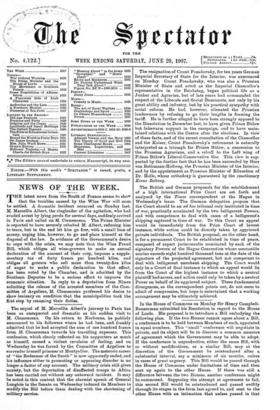The British and German proposals for the establishment of a
high international Prize Court are set forth and analysed by the Times correspondent at the Hague in Wednesday's issue. The German delegation propose that the Court should be an ad hoc tribunal only instituted in time of war, practically nominated by the two belligerent Powers, and with competence to deal with cases of a belligerent's shipping captured in time of war. To this Court an appeal would lie immediately from the Prize Court of lowest instance, while action could be directly taken by aggrieved private individuals. The British proposal, on the other band, is for a permanent Court to be established in time of peace, composed of expert jurisconsults nominated by each of the signatory Powers of the Hague Convention whose mercantile marine exceeds eight hundred thousand tons at the date of the signature of the projected agreement, but not competent to deal with belligerent merchant shipping. The Court would only be a Court of final instance to which an appeal would lie from the Court of the highest instance to which a neutral plaintiff had access, and action could only be taken by a neutral Power on behalf of its aggrieved subject. These fundamental divergences, as the correspondent points out, do not seem to admit of compromise, but hope is entertained that a working arrangement may be ultimately achieved.
















































 Previous page
Previous page